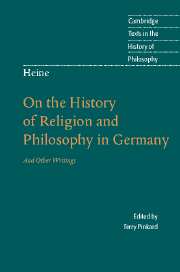Introduction
Published online by Cambridge University Press: 05 June 2012
Summary
At his death in 1856, Heinrich Heine was the most widely read poet in Europe. He was also a prolific essayist and critic, and his poems have been set to music more often than those of any other poet. Both in his own time and in ours, he has been known as a “political poet” since he championed the cause of the oppressed, and as a friend of sorts of Karl Marx, he was regarded as a “socialist” poet for many years, even though he himself was as wary of Marx's communism as he was distrustful of the emerging commercial and industrial society around him.
Heine was also not merely a German poet, but a German Jewish poet (who for a while had rather pro forma converted to Christianity), and the anti-Semites in Germany did their best to make sure nobody forgot the “Jewish” part. If anything Heine seemed to regard himself as a German European; in 1822 while still in Berlin he himself noted, “I love Germany and the Germans; but I love no less the inhabitants of the rest of this earth, whose number is forty times greater – and it is surely love which gives a man his true value. I am therefore – thank God – worth forty times more than those who cannot pull themselves out of the swamp of national egotism and who love none but Germany and the Germans.”
- Type
- Chapter
- Information
- Heine: 'On the History of Religion and Philosophy in Germany' , pp. vii - xxxiiPublisher: Cambridge University PressPrint publication year: 2007
- 1
- Cited by

